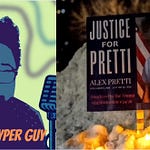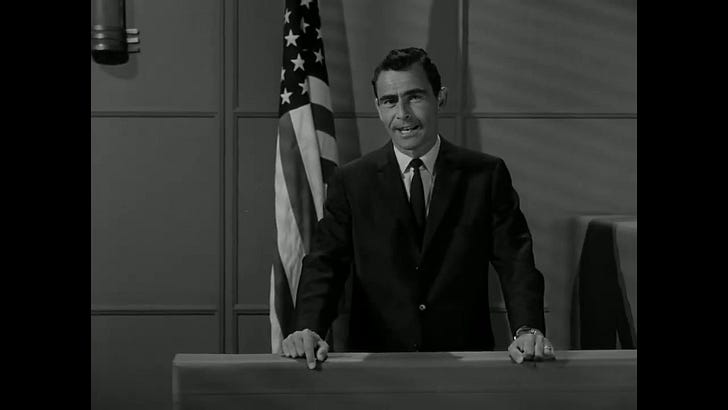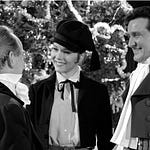Recent Supreme Court decisions have Democrats lamenting all the events that conspired to install George W. Bush in the White House — Bush v. Gore, hanging Chads, and Ralph Nader — but the unfortunate reality is Bush appointed both John Roberts and Sam Alito during his second term. How did our righteous rage over the 2000 election result in Bush expanding his electoral vote margins and actually winning the popular vote in 2004?
During my interview last year with actor Eliza Jane Schneider, we discussed her experience working for John Kerry’s 2004 campaign and the shady circumstances surrounding Bush’s victory in Ohio, which would set the stage for the Right’s eventual takeover of the federal judiciary.
Download the full podcast interview above and/or watch the YouTube version below.
Transcribed excerpts from our conversation.
ELIZA JANE SCHNEIDER: So [her critically acclaimed one woman show] Freedom of Speech, touches on the red and the blue and all of these various things affecting us as a society and then interweaves it in a way that hopefully is a testimony to the idea that we are all one. Hopes, dreams, fears, all the things as humans, you know, that can in fact love and relate to each other. through the differences and despite the disagreements and that there can be validity in conflicting points of view in order for me to be right. You don’t have to be wrong.
So 20 years ago, in Ohio, in 2004, there was something that we called the Freedom Winter Bus Ride that was far less publicized than this Insurrection Day [on January 6, 2021] because we didn’t shoot anybody. We didn’t have guns. We weren’t threatening violence. We didn’t have buffalo suits. We just got on a bus with statistics and very well-spoken attorneys and evidence and recordings of the actual face and voice of disenfranchisement.
And so I had at the time quit acting because I had gotten my play to Off-Broadway and they put me together with the director of Freak who kind of rewrote all of my verbatim characters. And to me, they felt like these kind of Mad TV caricatures. And I said, you know, if I have to sell out to this extent in order to take my show to the next level, I think I quit acting.
And I joined the [John] Kerry campaign and we went to Columbus, Ohio, and I was driving people to the polls. And mathematically, we had figured out that there were 250,000 registered Democrats in Columbus, and that was the pivotal precinct in a pivotal state. And if we just got everybody’s vote counted, no matter who they were, Democrat or Republican, mathematically, we would win.
And of course, what we weren’t prepared for was the other team’s football strategy, which was placing a person in charge of the Bush/Cheney reelection campaign as the president of the Board of Elections in that community where he got to decide how many machines per capita got put in each precinct.
So I went into his office with my microphone armed with a printout of the statistical relative number of machines per capita. And the top was all red. The ones who had the most per capita were all red and the bottom was all blue. And I was like, how does this happen? And he said, “Well, sometimes there’s a hotly contested school levy, so we have to make the decision that way as to how many machines.”
And I ended up writing another play and calling it Sounds of Silence, a documentary puppet musical farce about the 2004 elections in Ohio. The first episode of this podcast is going to be an expanded version of that play, which was considerably less popular than Freedom of Speech because after an election and even before an election, nobody wants to talk politics. Nobody wants to talk about an election.
So what I’m trying to bring to light is the voice behind what these elected officials are supposed to be doing, the decisions they’re supposed to be making about the money that affects whether or not a teacher gets paid, whether or not a health worker gets paid enough to get braces for her own kid.
Ohio Players
SER: It seems, for legitimate reasons, that often people focus on the 2000 election as kind of a pivot point — oh no, Bush v. Gore. But, Bush actually didn’t nominate any Supreme Court justices in his first term. Like Alito and Roberts are all from after 2005.
And so much hinged on Ohio. I remember watching Kerry concede Ohio, but there was a lot of discussion about what had occurred there. And that number you were targeting … that margin would have changed certainly the course of history in many ways.
ELIZA: Absolutely … if you’re a canvasser or working for one of these organizations like Act Blue or Move On, or the DNC, you’re given a script to get money from people on the street saying, “This is the most important election of our lifetimes!”
It’s always important, and I’m guilty of ignoring the texts asking me for money. I resent the fact that in order for my vote to be counted or my voice to be heard, I have to pay money to a private organization … that seems totally antithetical to democracy.
But with [Ohio Secretary of State Ken] Blackwell and the outstanding provisional ballots that were still uncounted in the middle of the night when Kerry conceded … you know, those of us who are putting our entire everything into trying to make sure that Bush didn’t stay in office that year [the concession] felt like being betrayed by a lover.
And then I felt bad because I had told people on the street when I was asking them for money in New York prior to driving to Columbus in that car that broke down halfway that we would have 17,000 lawyers. And suddenly, where were all these lawyers?
And the only people left in Ohio after Kerry conceded — the mainstream media all took off — were me and a muckraker named Evan Davis, who reported for Pacifica Radio. And even he was disallowed to report after a while because we were canvassing to find out what people’s actual experience was.
We would record dozens of people who said they pushed Kerry and it came up Bush, and then they were kicked out of their voting booth after their five minutes was up. I went to see [director of the Franklin County Board of Elections] Matt Damschroder and I looked at all these statistics and in the precinct that I was bound and determined to get one man’s vote counted on the actual election day,
In that precinct, there were 1,600 registered voters, and if you did the math at five minutes per day, 1,168 people would necessarily be turned away that day due to the number of machines. And that’s what long lines mean.
And then the guy had the nerve to say to me, “Well, it's too bad that you have to wait as long in a line to vote as you would have to wait to get on a roller coaster or take a flu vaccine.” And, you know, most people I don’t make fun of. And the voice I just used was demeaning, I suppose. But in that case, I think it was well earned.
I hope you’ll consider becoming a paid subscriber for $80 a year or just $8 a month, if you’re not already. This helps sustain the newsletter and keeps all the content free for everyone.












